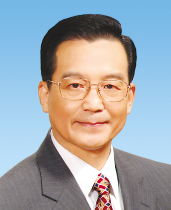Amid a row between China and the US-based search engine Google, Premier Wen Jiabao has said his country is looking forward to the strategic dialogue with Washington in May to resolve trade and currency disputes, even as he vowed to expand imports to achieve a trade balance.
 The second round of the China-US Strategic and Economic Dialogue in May here would be "very important" and provide a "chance" to solve disputes regarding trade and currency, he said.
The second round of the China-US Strategic and Economic Dialogue in May here would be "very important" and provide a "chance" to solve disputes regarding trade and currency, he said.
"We attach great importance to the dialogue," Wen was quoted by the official media as telling a group of overseas entrepreneurs attending a meeting of China Development Forum here on Monday night.
His remarks come as the US is pressing China to appreciate its currency Yuan and attempting to limit the Chinese products from entering its market by raising trade barriers.
Another issue straining the bilateral relations is the row between Google and China over censorship laws and complaints by American business houses that they are being discriminated by Beijing which they allege is favouring the local companies.
Google, in a prelude to closing down its operations in China, has lifted censorship on its China web content and redirected its users to a website in Hong Kong, prompting Beijing to say that it is a violation of written commitments given by the American search engine.
Wen said he believes some existing differences and problems could be solved through fair consultation between the two countries.
"Looking back, the disputes and differences between China and the United States have been settled one by one, leading to an increasingly close political and economic relationship," he said.
China welcomes American enterprises to explore business in China and would expand imports from the United States in the future, he said.
He rejected the US allegations that China is undervaluing its currency to swell its trade surplus, saying Beijing is likely to run a trade deficit of over $8 billion in March.
Wen said China will buy more US goods to balance the trade and expects problems with Washington to be addressed in May during the strategic dialogue.
"To be honest, I was happy when I learnt of the situation (about the projected deficit in March)," he said, adding his country is "by no means seeking a trade surplus. On the contrary, we
US legislators have been demanding that the Obama Administration label China a currency manipulator in a treasury report due in mid-April.
They argue that China's "undervalued" currency has led to the rising US trade deficit and increasing unemployment.
The declaration will make it possible for Washington to slap duties on Chinese imports.
Acknowledging US concerns, Wen said "I know there is an unemployed population of two million in the US, which makes the government very anxious. But in China, we have 200 million people without jobs, and a huge gap between urban and rural areas."
The registered jobless rate in cities and towns was four per cent last year, but an Academy of Social Sciences report put the figure at 9.4 per cent. This, along with the number of surplus labourers in the countryside, amounts to 200 million people, he said.
In response to a question from Chairman of Morgan Stanley Asia, Stephen Roach, on emerging trade disputes and protectionism, Wen urged all countries and companies not to start trade and currency wars, which would be harmful to the recovery of world economy.
"We are happy that the world economy shows good signs of recovery, however, some factors make us feel that the recovery will not be so smooth," he said, referring to high unemployment in some big economies, unstable prices of bulk products and inflation.
He called on people around the world to stay cool-headed and said China promises not to pursue trade surplus and wants to enlarge the country's imports.
He said China's future economic growth relies on technology development, in particular, high technology such as life and biological technologies.
As for China's emission cut plan, Wen said the country regards its energy conservation and emission cut as an important strategy throughout the 11th and 12th five-year plans as well as its future development.
"We will implement our goal of 40-45 per cent reduction of carbon intensity by 2020 in the 12th five-year plan," he said.
Concerning China's capital market reform, Wen admitted that some problems still exists in the management and monitoring of the financial sector, adding China is determined to establish an "integrated, sound and sustainable" financial system.
China would combine direct and indirect financing to expand the role of the capital market, he said.










 © 2025
© 2025